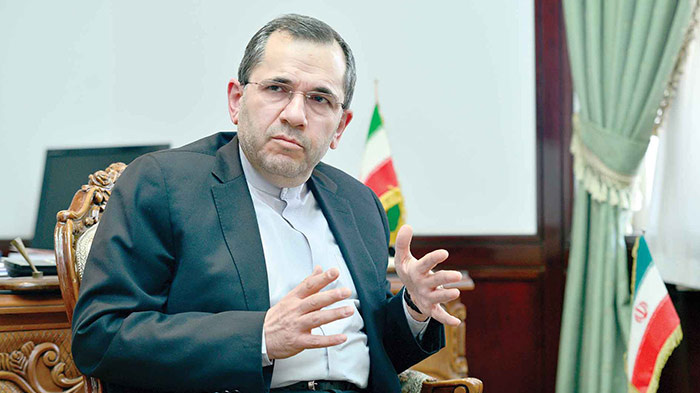Beyond Normal: Deputy FM hails progress in Iran-EU relations

On Monday, January 30, 2017, Iranian Deputy Foreign Minister for European and American Affairs Majid Takht-Ravanchi sat in an interview with Iranian Students News Agency (ISNA), to discuss the latest developments in the country’s policy toward the West.
Referring to a recent visit by French Foreign Minister Jean-Marc Ayrault and another imminent one by the Swede Prime Minister, Takht-Ravanchi labeled the ties between Iran and European countries "above normal".
The French Foreign Minister’s visit is a sequel to talks held with France previously, he told ISNA. Referring to President Hassan Rouhani’s visit to Paris last year, during which he met several officials of the West European country, the senior foreign ministry official said many agreements were reached in several areas, the results of which are gradually becoming evident. “As an example, a contract was signed between France’s Peugeot and Iran Khodro, who will be releasing their first joint product in the near future,” he added.
Saying his visit to France a few months ago was in the framework of ongoing regular political consultation between the two countries, Takht-Ravanchi added that the French FM’s visit is intended to be in the same framework, as well as to hold a joint committee meeting.
Ravanchi said the two countries’ joint committee would be held presided by the two foreign ministers, explaining that the committee incorporates several issues and the sides are now working on a joint document that will be issued at the end of the visit.
He said that the committee would review economic, cultural, and political agreements recently made between the sides once again. “In addition to bilateral issues, negotiations will take place on regional and global issues in order for the sides to further get to know each other’s approaches toward different issue,” he added.
In response to a question about talks between Iran and Canada and what has impeded a tangible result, Takht-Ravanchi said the previous Canadian administration had adopted positions against Iran, trying to sync its stance with countries that were hostile to the country. “The new Canadian officials have expressed interest for improvement in ties before and after their campaign, even bringing up the possibility for the two countries’ embassies to reopen. We also welcomed the proposition and stressed that we were ready to reestablish ties with Canada based on international law, the principle of non-interference in each other’s domestic affairs, and equality,” ISNA quoted Takht-Ravanchi as saying.
An obstacle on the way of the process is a law passed in the Canadian parliament during the previous administration’s term, which revoked Iran’s political immunity in the country, Takht-Ravanchi said.
The senior diplomat stressed that the obstacle must absolutely be removed and a part of the current mutual talks concerns the issue. Calling it a time-consuming process, the nuclear negotiator said Iran is in no hurry. “We are interested in having good relations with Canada within the framework of international principles and those principles for which we had a revolution,” he added. Saying the talks are ongoing between the sides, he said Iran welcomes Canada’s interest to enter a new phase in its ties with Tehran but also stresses that words should be translated into action, a good instance of which could be the nullification of the law.
In response to a question on whether Iran has contacted US President Donald Trump’s team, he said Iran has not been engaged in talks with the Trump administration and has no plan to do so, even in the future. “The nuclear deal was an issue for which we had contacts with the P5+1 group members, including the US, but we should see how it goes in the future. Basically, the talks’ framework we have with the P5+1 should continue to exist. However, we should wait to see how things will go,” he added.
Speaking about the Swede Prime Minister’s visit to Tehran, he said it would take place from February 10 to February 12. According to Takht-Ravanchi, the Swede Prime Minister will arrive in Tehran, leading economic and political delegations. “We anticipate that good issues will be brought up between Iran and Sweden,” he added.
Noting the advanced Swedish industrial sector, he said the two countries could cooperate in different areas, including energy and auto industry, as both sides have the necessary potentials. He went on to emphasize that the visit indicates that Iran’s ties with Europe has reached above normal levels.
When asked about the appointment of Iran’s ambassador to Sweden, he said the new ambassador has been chosen and the bureaucratic and diplomatic stages of the work are underway. He refused to name the official.
Speaking about regional cooperation between Iran and the EU and his opinion on whether these talks will end in tangible results, Takht-Ravanchi reiterated that European countries have been affected by Middle East developments including terrorism and refugees and are thus trying to find solutions for these problems.
The senior Iranian diplomat further noted that the EU and its members view Iran as a ‘seasoned state’ that could help resolve regional crises. “Our talks with the EU on regional issues take place in such a landscape but for them to bear results, we should wait for time to pass and see where things will go,” ISNA quoted Iran’s nuclear negotiator as saying. “Clearly, both sides want the talks to continue,” he added.
Speaking on the mutual ties between the sides, Takht-Ravanchi said several Iranian embassies are working with EU committees on respective specialized areas, with constant visits and contacts. “In addition to bilateral issues, there is much ground regarding regional issues where cooperation and negotiations could take place. As I said before, both sides are welcoming the talks and want them to continue,” he concluded.

